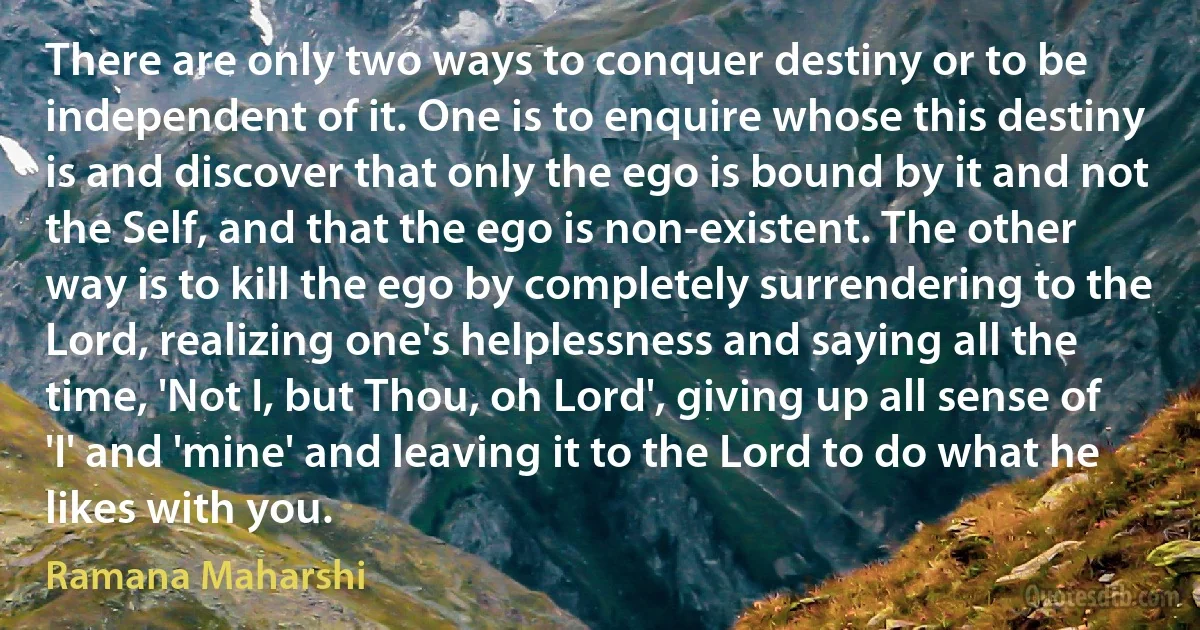Ego Quotes - page 29
'I have a relative who is in a mental hospital. He thinks he is Christ. Well, that's groovy. I am Christ also. But he doesn't think I am Christ. He thinks he is Christ. Because it happened to him and he took his ego with him. So he says: I'm special. And when I say to him: Sure man you're Christ. And I'm Christ too. He says: you don't understand. And when he's out he steals cars and things like that because he needs them because he's Christ and that's all right. So they lock him up. He says: I don't know ... me ... I'm a responsible member of society. I go to church. Me they put in a mental hospital. You're free. You've got a beard. You wear a dress ... you ...
Sure. Because as far as I'm concerned we are all God.
That's the difference.
If you really think another guy is God he doesn't lock you up...Funny about that.

Ram Dass
One attraction of being National Security Advisor is the sheer multiplicity and volume of challenges that confront you. If you don't like turmoil, uncertainty, and risk- all while being constantly overwhelmed with information, decisions to be made, and the sheer amount of work, and enlivened by international and domestic personality and ego conflicts beyond description- try something else. It is exhilarating, but it is nearly impossible to explain to outsiders how the pieces fit together, which they often don't in any coherent way.

John R. Bolton
Purity of heart will not make us poor. The exaltation of poverty as a spiritual virtue is of the ego, not the spirit. A person acting from a motivation of contribution and service rises to such a level of moral authority, that worldly success is a natural result.
Give all your gifts away in service to the world. If you want to paint, don't wait for a grant. Paint a wall in your town that looks drab and uninviting. You never know who's going to see that wall. Whatever it is you want to do, give it away in service to your community.

Marianne Williamson
There'd been no escape. What did she so desire to escape from? Such a captive maiden, having plenty of time to think, soon realizes that her tower, its height and architecture, are like her ego only incidental: and what really keeps her where she is is magic, anonymous and malignant, visited upon her from outside and for no reason at all. Having no apparatus except gut fear and female cunning to examine this formless magic, to understand how it works, how to measure its field strength, count its lines of force, she may fall back on superstition, or take up a useful hobby like embroidery, or go mad, or marry a disc jockey. If the tower is everywhere and the knight of deliverance no proof against its magic, what else?

Thomas Pynchon
I'm always hyper-aware of how not to be a you-know-what. So to actually let it go and to lean into all the ridiculous fame nonsense that I've been trying to side-step for all of these years just felt really, really fun. It just felt great and to play someone who had such an enormous ego and someone who takes herself so seriously, and is so insufferable, came very naturally to me.

Anne Hathaway
What happens is, people get a little taste of fame, and they get used to having things go that way, and the ego really kicks in. They'll do whatever it takes to stay there. They get addicted, and they make decisions that don't have anything to do with music. You get big like that, and people will maybe come and see you once. It never lasts. It's not real. I'll tell you this - it's fucking real behind a guitar.

Ryan Adams
What the hell is this?? Who can tell me?? Does anybody know?? How can I find out more about it?? One thing's sure: the human mind can't "know" it...why does one want to "know"?? Is it a quest for "freedom"? One no longer wishes to be a puppet dancing on the strings of...of what? Animal instincts?? Learned reflexes? Programmed behavior?? Ingrained habits of perception?? How limited are we by the experience of our senses, by our physical nature?? To be fully alive is a stupendous struggle! We want the rewards without the struggle--- ---a fatal error! ...No such thing as an easy life! Everybody has a hard time...struggle or die! To find out what's really going on it's necessary to get around the ego..an art requiring persistent and determined effort...Me, me, me...myself & I...oh no!!! Trapped in my stupid self!

Robert Crumb
But leaving aside disputes as to what may be to us "happiness” in a future separated from our present by millions of years, so that we are no more fitted now to formulate its conditions than is a child, playing with its dolls, to formulate the deeper joys and interests of its maturity, let us understand that, according to the teachings of the Esoteric Philosophy, the Devachanī is surrounded by all he loved on earth, with pure affection, and the union being on the plane of the Ego, not on the physical plane, it is free from all the sufferings which would be inevitable were the Devachanī present in consciousness on the physical plane with all its illusory and transitory joys and sorrows. It is surrounded by its beloved in the higher consciousness, but is not agonised by the knowledge of what they are suffering in the lower consciousness, held in the bonds of the flesh.

Annie Besant
The ego rules the mind because it links the "I” with the mind and body. If the "I,” which is another name for the self, were not identified with the mind and body, the ego would have no power. Self-study, svadhyaya, therefore, is the set of practices that investigates the nature of the self to discover its origin. When the origin is found to be separate from the body, the ego loses the battle and peace is attain.

Baba Hari Dass
The truth is that we need to reexamine and redefine our culture. Some of us do not believe that in our culture, femininity has always meant: weak, passive delicate looking... in other words, qualities that inflate the male ego. The women of La Raza is traditionally a fighter and revolutionary.

Elizabeth Martinez
When a person has inwardly struggled with his anima or with her animus for a sufficiently long time and has reached the point where he or she is no longer identified with it in an unconscious fashion, the unconscious once again takes on a new symbolic form in relating with the ego. It then appears in the form of the psychic core, that is, the Self. In the dreams of a woman, the Self, when it personifies itself, manifests as a superior female figure, for example, as a priestess, a sorceress, an earth mother, or a nature or love goddess. In the dreams of a man, it takes the form of some-one who confers initiations (an Indian guru), a wise old man, a nature spirit, a hero, and so forth. An Austrian fairy tale recounts the following:.

Marie-Louise von Franz
Everything which the ego is able to unfold within itself must give birth to love. The all-embracing archetype of love is set forth in the revelation of... the Christ Mystery. Through Him the germ of love is planted in the innermost core of the human being; and from this starting-point it must flow through the whole of evolution. Just as the wisdom previously formed manifests in the forces of the earthly sense-world, in the "elementary forces” of to-day, so love itself will manifest in the future, in all phenomena, as the new "elementary force.”.

Rudolf Steiner
We like to do something good. And you know, we like to be praised for it. Now if you don't believe that, you just go on living life, and you will discover very soon that you like to be praised. Everybody likes it, as a matter of fact. And somehow this warm glow we feel when we are praised or when our name is in print is something of the vitamin A to our ego. Nobody is unhappy when they are praised, even if they know they don't deserve it and even if they don't believe it. The only unhappy people about praise is when that praise is going too much toward somebody else. But everybody likes to be praised because of this real drum major instinct.

Martin Luther King Jr.
I want to just go back to a great rabbinical and also, as you see, monastic, Christian development beyond what the Greeks like Plato or Cicero already knew about friendship. That it is from your eye that I find myself. There's a little thing there. They called it pupilla, a "puppet" of myself which I can see in your eye. The black thing in your eye.
Pupil, puppet, person, eye. It is not my mirror. It is you making me the gift of that which Ivan is for you. That's the one who says "I" here. I'm purposely not saying, this is my person, this is my individuality, this is my ego. No. I'm saying this is the one who answers you here, whom you have given to him.

Ivan Illich
Look at all of Bo's hos, lookin' for a ride on Bo's hose
And I spot a little Latino, booty so big, call it "Oprah's ego"
We go to it, through it / She says "¡Dios mia, mi amigo!"
Pull it out, stick it in your mouth, and I bust in the back of ya
"Swallow bitch! There's people starvin' in Africa!"

Bo Burnham
A law explains a set of observations; a theory explains a set of laws. The quintessential illustration of this jump in level is the way in which Newton's theory of mechanics explained Kepler's law of planetary motion. Basically, a law applies to observed phenomena in one domain (e.g., planetary bodies and their movements), while a theory is intended to unify phenomena in many domains. Thus, Newton's theory of mechanics explained not only Kepler's laws, but also Galileo's findings about the motion of balls rolling down an inclined plane, as well as the pattern of oceanic tides. Unlike laws, theories often postulate unobservable objects as part of their explanatory mechanism. So, for instance, Freud's theory of mind relies upon the unobservable ego, superego, and id, and in modern physics we have theories of elementary particles that postulate various types of quarks, all of which have yet to be observed.

Johannes Kepler
The functional importance of the ego is manifested in the fact that normally control over the approaches to motility devolves upon it. Thus in its relation to the id it is like a man on horseback, who has to hold in check the superior strength of the horse; with this difference, that the rider tries to do so with his own strength while the ego uses borrowed forces. The analogy may be carried a little further. Often a rider, if he is not to be parted from his horse, is obliged to guide it where it wants to go; so in the same way the ego is in the habit of transforming the id's will into action as if it were its own.

Sigmund Freud



